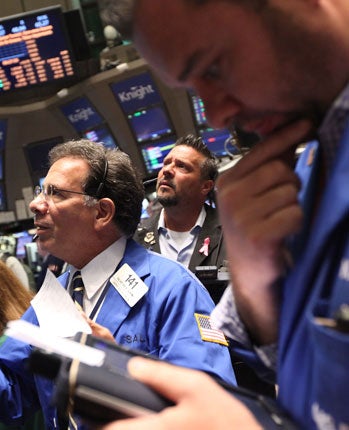Desperate ECB in bid to contain eurozone crisis

Your support helps us to tell the story
From reproductive rights to climate change to Big Tech, The Independent is on the ground when the story is developing. Whether it's investigating the financials of Elon Musk's pro-Trump PAC or producing our latest documentary, 'The A Word', which shines a light on the American women fighting for reproductive rights, we know how important it is to parse out the facts from the messaging.
At such a critical moment in US history, we need reporters on the ground. Your donation allows us to keep sending journalists to speak to both sides of the story.
The Independent is trusted by Americans across the entire political spectrum. And unlike many other quality news outlets, we choose not to lock Americans out of our reporting and analysis with paywalls. We believe quality journalism should be available to everyone, paid for by those who can afford it.
Your support makes all the difference.The European Central Bank (ECB) signalled last night it was willing to begin massive purchases of Italian and Spanish bonds in an effort to contain the deepening financial crisis in the eurozone.
As the White House grappled with the US's economic troubles after a credit-rating agency reduced its standing on Friday, the ECB's governing council – which includes central bank governors of all the eurozone's 17 member states – held a conference call.
Last night the bank issued a statement saying that it would "actively implement" a bond purchase programme that could boost Spanish and Italian bonds and drive down interest yields that threaten those countries' budgets. The move was designed to help Rome and Madrid fend off market attacks until a strengthened eurozone bailout fund is approved to help them.
There were reports that the ECB members were split down the middle on how to best handle the Italian debt question. German officials in particular had wanted to see tougher austerity measures enforced before the ECB made any commitment to taking on the debt loads.
In a sign of British frustration, George Osborne called for more to be done on a co-ordinated basis to reassure the markets. "By its nature, a global crisis cannot be solved by countries acting alone," the Chancellor said. "Eurozone countries must now act swiftly to deliver on what they have promised. Euro-area institutions need to do whatever is necessary to ensure financial stability."
The ECB did not specify which countries' bonds it would buy in the statement after the conference call but the beneficiaries are expected to be Italy and Spain, say analysts. They are trying to avoid financial collapses like those that forced Greece, Ireland and Portugal to seek bailout loans. As traders returned to their desks in Asia last night, the early signs pointed to a further plunge in stock markets around the world, in response to the turmoil in the eurozone and Standard & Poor's move to cut the US credit rating. Oil prices fell and safe-haven assets including gold rose to new highs in the opening minutes of trading, though markets are expected to be volatile as investors digest the new landscape.
Jean-Claude Trichet, ECB president, was said to want the council to take a final decision on purchasing bonds, which would enable the central bank and eurozone national banks to start buying up Italian debt. Finance ministers and central bankers from the G7 were also due to hold emergency talks before markets open in East Asia in an attempt to forge a global response to the eurozone crisis and ease fears about US creditworthiness.
In an effort to contain the economic crisis in Italy, the Prime Minister, Silvio Berlusconi, announced new measures on Friday aimed at speeding up deficit reduction and financial reform. They included a pledge to balance the budget by 2013 and the introduction of austerity measures a year ahead of schedule. The moves were designed to allay market fears that Rome would be unable to sustain such a high level of debt while economic growth re-mains slow. However, concern that the package would not be enough to calm the markets prompted the ECB to consider intervention.
Spain is similarly affected by high unemployment, high government debts and slow growth. Analysts have argued that investors had expected the ECB to start buying up Italian and Spanish debt after the eurozone leaders' 21 July summit and that its failure to do so sparked the current crisis of confidence.
Yesterday's ECB summit came after a week that saw $2.5 trillion wiped off global stock markets. The shock falls have dramatically increased the pressure on European and US political leaders to reassure investors their governments are capable of cutting debt.
Washington's last-minute default-saving deal will see the US debt limit raised by $2.4trn from $14.3trn. But it has spectacularly failed to impress the credit ratings agencies. On Friday, one of the world's three major ratings agencies, Standard & Poor's, downgraded America's rating from AAA to AA+ in a move that was seen as a major embarrassment for President Obama. Analysts say the revised rating could raise the cost of US government borrowing.
Gene Sperling, a senior White House economic adviser, condemned the revised rating, insisting: "It smacked of an institution starting with a conclusion and shaping any argument to fit it."
Standard & Poor's responded yesterday with a threat to downgrade the US further.
Join our commenting forum
Join thought-provoking conversations, follow other Independent readers and see their replies
Comments